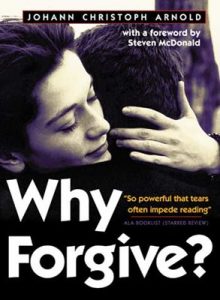Why Forgive?
by Johann Christoph Arnold
 “Forgiveness is a door to peace and happiness,” begins Johann Christoph Arnold in this book of vignettes and lessons about the power of forgiveness. He continues, “It is a small, narrow door, and cannot be entered without stooping. It is also hard to find. But no matter how long the search, it can be found.” These opening lines are the distillation of the central message of the book: to forgive is not easy, but it is both necessary and freeing.
“Forgiveness is a door to peace and happiness,” begins Johann Christoph Arnold in this book of vignettes and lessons about the power of forgiveness. He continues, “It is a small, narrow door, and cannot be entered without stooping. It is also hard to find. But no matter how long the search, it can be found.” These opening lines are the distillation of the central message of the book: to forgive is not easy, but it is both necessary and freeing.
Arnold’s book is a collection of true stories about forgiveness on a spectrum from extraordinarily serious to everyday. On one end of the spectrum, there are stories of people who have forgiven great violence against themselves or their families, such as a survivor of the genocide in Rwanda. On the other end are stories that highlight the necessity of forgiveness on a daily basis for all those little things that sting.
Arnold points out a number of truths about forgiveness that are worth contemplating in prayer. First, he demonstrates continuously throughout the book that forgiveness is the Christian response to being wronged. There is no other. But he does not say that this means that you can just do it, on your own, because you know it’s the right thing to do. He quotes Dr. Martin Luther King, Jr., who said, “Probably no admonition of Jesus has been more difficult to follow than the command to love our enemies.” Arnold recounts how in some cases, forgiving takes years, and in all cases, it is a continual process, not a one-time event.
While Arnold never uses the word grace for what occurs in the hearts of those people who are able to forgive their enemies, to a Catholic reader it is clear that God is working in them. The storytellers describe it in these ways: “Immediately a wave of relief and healing came over me”; “Disarmed, I melted and assured him of my forgiveness on the spot. There was no way I could have withheld it”; and “At that point all my hatred and anger was taken away. It was like some great weight had been lifted off my shoulders.” It was edifying to read stories of God working in this clear way.
A great number of the stories in Arnold’s book are of extraordinary circumstances, and truly heroic acts of forgiveness: people able to forgive the murderer of their child, or an abuser who’d taken their innocence. People who can embrace someone who had beaten, paralyzed, or blinded them. Because these stories were so dramatic, the chapter on forgiveness in marriage was a welcome relief and a way to see that while not everyone suffers as tremendously as the other contributors, there is no one who is not in need both of forgiveness and to forgive others.
In marriage, forgiveness is a daily necessity. Asking one’s spouse to forgive you requires, in Arnold’s words, “humility, vulnerability, and the acknowledgement of weakness and failure.” Arnold shares personal stories from his own marriage of forty-three years and the story of his wife’s parents, who separated for eleven years because of resentment that had built up in their relationship, to show how often the little things eat away at marital love. He also addresses forgiveness of a spouse after adultery.
Why Forgive? is a powerful book of stories and a great reminder to examine your relationships often in order to forgive and heal before you allow yourself to build up anger and resentment. This is especially true with our families, because the ones closest to us are often those who hurt us the most as well.
About the reviewer
Sara Perla is the Program Specialist for the Subcommittee for the Promotion and Defense of Marriage at the United States Conference of Catholic Bishops. She attended the Catholic University of America and received her Masters degree in Theological Studies at the Pontifical John Paul II Institute in Washington, D.C. She is also a baker, a ballet dancer, and an avid listener of NPR podcasts.
Disclaimer: Book reviews do not imply and are not to be used as official endorsement by the USCCB of the work or those associated with the work. Book reviews are solely intended as a resource regarding publications that might be of interest to For Your Marriage visitors.




